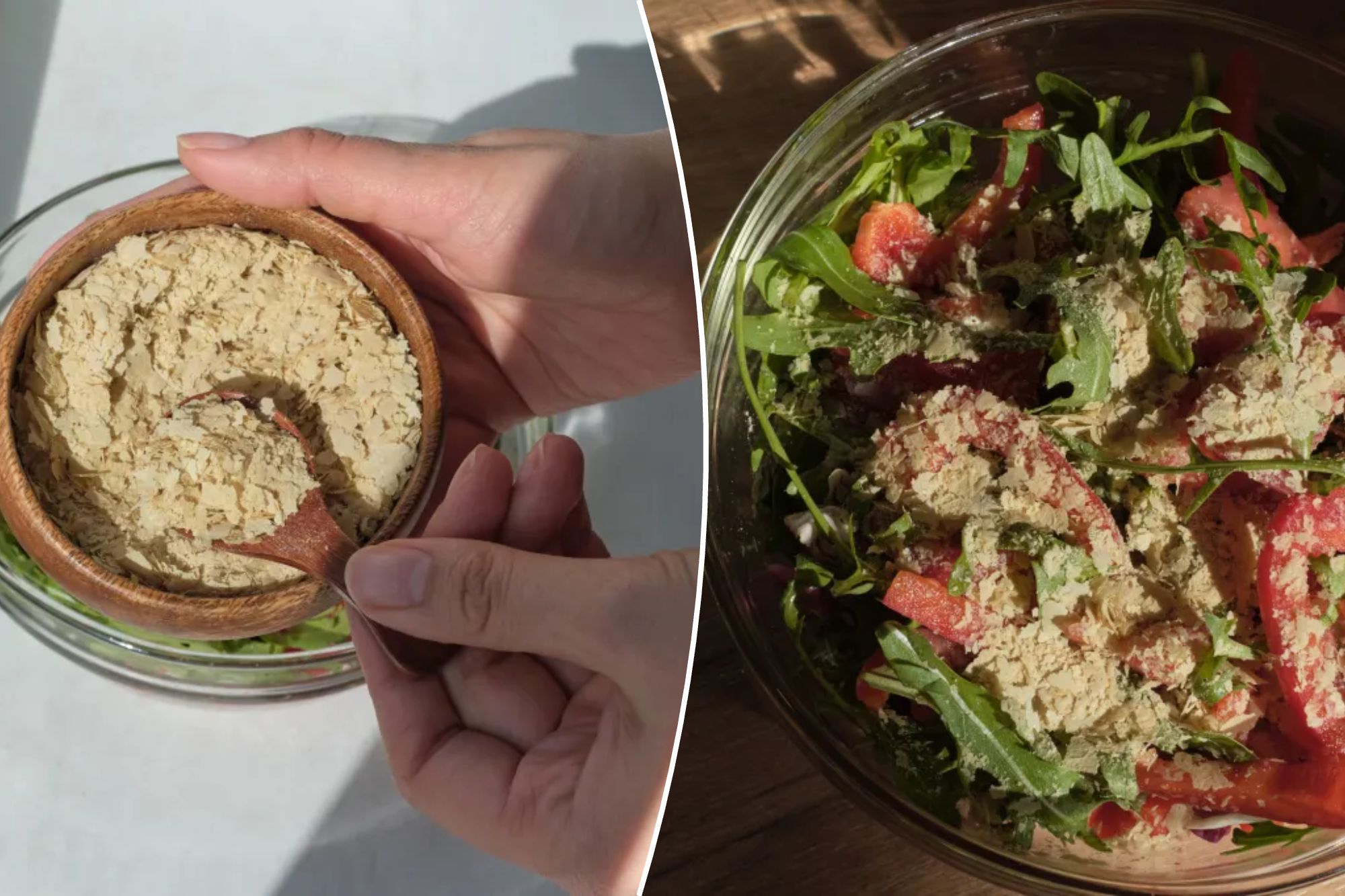Keep the Parm, pass the Nooch.
The seasoning of plants, officially called nutritional yeast, has long been for vegans who seek to give their food a salty impulse, Umami.
But it is not just a taste. Nooch is full of vitamins, minerals and other nutrients that can make wonders for your health. It then shows how to use it, and why newbies must proceed with caution.
What is nutritional yeast?
It is made up of Saccharomyces cerevisiae, an ancient species of live yeast, according to Food Network.
The unicellular fungus is also used for baking bread, but nutritional yeast passes through a warm-up and drying process that disables it, stripping it from its east properties.
This same process unlocked its amino acids and provides Nooch its signature of salty and salty taste. Then he crushed in flakes or powdered and packaged soil.
People usually sprinkle nutritional yeast in corn popcorn, pasta, salads and roasted vegetables to expand the taste. It is also aggravated by soups, stews and sauces as a thick agent.
What are Nooch’s health benefits?
Natural nutritional yeast contains a few nutrients in themselves, but most of the shelves in the store are fortified, that is, they have been enriched by added vitamins and minerals.
“Nutritional yeast is a beneficial food for anyone, but especially for those who follow a diet based on plants,” said Christina Manian, a registered dietitian nutritionist, in Real Simple.
“This is mainly due to vitamins B it contains, including thiamine, riboflavin, niacin, B6, folate and B12. All of this will help the metabolism of optimal energy in the body,” he said.
B12 is especially important because it is difficult to put it on a vegan diet. Vitamin supports blood and healthy nerve cells, helps the body to make DNA and can give it an energy impulse.
Folic acid, another vitamin B, is essential for women who can become pregnant, helping to protect the fetuses in development of certain birth defects. The CDC recommends 400 daily micrograms and most Nooch products provide more than in a single portion.
Nutritional yeast also offers antioxidants such as glutathion and selenometine, which help decompose free radicals, combat inflammation and reduce the risk of chronic diseases.
It is also one of the few plant foods that contains the nine essential amino acids that the body cannot produce on its own, making it a complete protein like those found in animal products, according to WebMD.
These amino acids are needed to build and repair tissues, produce enzymes and hormones and support general health.
“Nutritional yeast contains Healthy Heart proteins that do not contain saturated fat and cholesterol that are used by the artery, and is low in sodium,” said Maxine Smith, a registered dietitian, in Parade.
It is also rich in beta-glucan, a type of fiber that can reduce cholesterol and strengthen the immune system. One study found that people who ate nutritional yeasts had 25% less likely to be cold and those who did so had softer symptoms compared to a placebo group.
The same fiber supports digestive health, acting as a prebiotic that feeds good bacteria in the gut and promotes regular gut movements.
Some studies also suggest that it can help people with SII, and researchers found that patients who took 500 mg daily for eight weeks had less problems with swelling, pain and discomfort.
Nutritional yeast also contains chromium, a mineral that has a paper in the regulation of blood sugar. Combined with its fiber content, Nooch can help stop the wishes and stay longer, which could withstand healthy weight and reduce the risk of diabetes and heart disease.
What are Nooch’s potential disadvantages?
Before starting to throw the nutritional yeast to everything, make a pace. Too much good thing can go back.
Some brands are sent more than the recommended daily amount of niacin (vitamin B3) in just two tablespoons, according to Harvard Health.
The elevated doses of niacin can cause to cool, where the arms, face and chest turn red and begin to burn, itching or tingling. It can also cause headache, eruptions and dizziness.
Nooch is also loaded with fiber, with 20% of your daily needs in a portion of two tables. While most North -Americans could use more in their diet, increasing intake too quickly can cause swelling, ramps and other uncomfortable gastrointestinal symptoms.
If you have an allergy to intestinal yeast or diseases such as Crohn ulcerative colitis or ulcerative colitis, nutritional yeast could worsen the symptoms.
It also contains Tiramin, a compound that can interact dangerously with an antidepressant class known as Maois. For the people of these medicines, even small amounts can trigger a sudden spike in blood pressure and painful headaches.
How to use it without losing
If you have dietary sensibilities or pre -existing conditions, see your doctor before adding nutritious yeast to your diet.
There is no official recommendation for eating daily, but starting with a tablespoon and gradually increasing from there is a safe bet, according to Verywell Health.
Nutritional yeast can be an easy and tasty way of adding additional, mineral and protein vitamins to your meals, but experts say that you should not treat it as a multivitamin.
“It is intended to be a seasoning, not taken as an excess supplement or eaten,” said Nancy Oliveira, a registered dietitian, to Harvard Health.
#Nooch #sprouting #food #strain #additional #vitamins #Heres
Image Source : nypost.com
